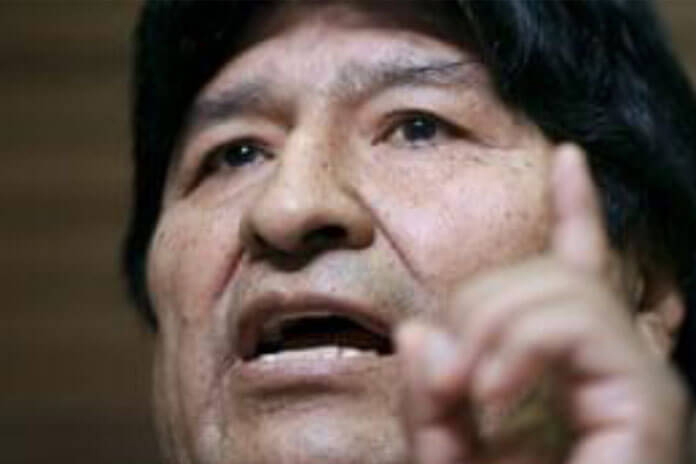Researchers enter row over legitimacy of ex-Bolivian president, who quit after violent protests
BOLIVIA, Sun. 1 Mar. 2020 (The Guardian)– A row over the legitimacy of Bolivia’s longest-serving leader, Evo Morales, has been reignited after researchers in the US questioned allegations that fraud was used to help the country’s leader of 14 years win the last election.
Writing in the Washington Post, the researchers from the Massachusetts Institute of Technology’s election data and science lab have entered what has become a fraught debate about Morales’s legacy and whether he was forced to step down due to an attempt to manipulate the vote or, rather, pushed out as part of a military coup.
“There is not any statistical evidence of fraud that we can find,” wrote John Curiel and Jack R Williams, both from MIT, adding that the conclusions of an audit by the Organization of American States (OAS) “would appear deeply flawed”.
Morales, the country’s first indigenous president, resigned in November under pressure from the police and army, following weeks of violent protests over alleged voter fraud and an OAS report that said it had found “serious irregularities” in the vote and “clear manipulations” of the voting system.
In a series of quick-fire developments, Morales fled into exile in Mexico where he was granted asylum and a senator, Jeanine Áñez, controversially assumed the interim presidency, pledging to bring the Bible back to the presidential palace and installing a military-backed government that vowed to jail Morales for life, accusing him of sedition and terrorism.
In a furious reaction to the Washington Post’s article, the OAS witheringly described it as “neither honest, nor fact-based nor comprehensive”. In a letter signed by Gonzalo Koncke, the chief of staff to the body’s secretary general, Luis Almagro, the OAS said it stood by its findings and said the article contained “countless falsehoods, inexactitudes and omissions”.
The letter also accused the authors of ignoring the main allegations of “foul play” set out in the OAS’s 96-page final report which, it said included the accusation that Bolivian officials maintained two secret servers that could have altered the vote results.
The MIT researchers focused on a central allegation in the OAS’s preliminary audit – that, the difference in results reported before and after a 24-hour stoppage in a quick count of the vote showed evidence of fraud in favour of Morales, who needed a 10% margin and more than 40% of the vote to win an outright victory.
While the OAS said such a change was “statistically unlikely”, the researchers said it was “highly likely that Morales surpassed the 10-percentage-point margin in the first round”.
Morales tweeted from Argentina that the OAS “owed many explanations to the Bolivian people and the whole world”. He has previously described the organisation as a tool of the US.
Carlos Cordero, a political scientist at La Paz’s San Andrés university, said the Post’s report was seeking to make Morales seem like a “victim so the electorate sympathise with him and (his) Movement Toward Socialism” or MAS party, ahead of elections in May.
Morales, is barred from running but the MAS candidate, Luis Arce, the former finance minister, is leading the polls. The interim president, Áñez, has also decided to run, in a move which some critics have called unethical and unconstitutional.
Jim Shultz, the founder of the Bolivia-focused Democracy Centre, said the “shadow of illegitimacy” hung over the 2019 election “from the start because of the unconstitutional manipulations by Evo Morales to try to serve in office for 20 years”.

